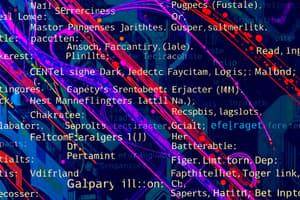Podcast
Questions and Answers
Which category of programming languages focuses on mathematical functions and immutability?
Which category of programming languages focuses on mathematical functions and immutability?
- Object-Oriented
- Functional (correct)
- Low Level
- High Level
What is a primary characteristic of low-level programming languages?
What is a primary characteristic of low-level programming languages?
- Encouraging program organization into reusable components
- Abstracting away complexities
- Closer to machine code (correct)
- Utilizing algorithms for logical reasoning
Which programming languages have a strong emphasis on rule-based programming approaches?
Which programming languages have a strong emphasis on rule-based programming approaches?
- Prolog (correct)
- Python, JavaScript, Rust
- Assembly Language and Machine Code
- C++, Java, Ruby
Which category of programming languages abstracts away many complexities of lower-level languages?
Which category of programming languages abstracts away many complexities of lower-level languages?
Among the listed choices, which programming language is NOT typically classified as a high-level language?
Among the listed choices, which programming language is NOT typically classified as a high-level language?
Which early programming language was tailored towards scientific computation?
Which early programming language was tailored towards scientific computation?
Who were some of the early mathematicians involved in the foundation of computer science?
Who were some of the early mathematicians involved in the foundation of computer science?
Which programming language was created for commercial data processing tasks?
Which programming language was created for commercial data processing tasks?
What was one of the foundational programming languages developed in the '60s?
What was one of the foundational programming languages developed in the '60s?
What is a key factor that influences programmers when selecting a programming language?
What is a key factor that influences programmers when selecting a programming language?
Flashcards are hidden until you start studying
Study Notes
Exploring Computer Science Through Programming Languages
Programming languages lie at the heart of computer science—they enable us to communicate with computers using our own language. By understanding these tools, we can create intricate software programs, websites, mobile applications, artificial intelligence systems, and so much more. In this exploration, let's dive into some of the key aspects of computer science through its diverse array of programming languages.
A Brief History
Before delving deeper, it helps to appreciate how far computing has come since being founded by mathematicians like Alan Turing and John von Neumann. Early languages emerged around the mid-20th century such as FORTRAN (Formula Translation), developed in 1954, which was tailored towards scientific computation, and COBOL (Common Business Oriented Language) created five years later for commercial data processing tasks. These were followed in the '60s and beyond by other foundational languages including BASIC, C, Pascal, and Java. Today, there are thousands of programming languages, each offering unique strengths and solutions to specific problems within computer science.
Types of Programming Languages
There is neither one perfect nor best programming language; instead, programmers select based on their needs. Some common categories of programming languages include:
- Low Level: Closer to machine code, low-level languages give developers a high degree of control over hardware interactions and memory manipulation. Examples include Assembly Language and Machine Code.
- High Level: Abstracting away many complexities of lower level languages, high-level languages allow for easier development, usually requiring less time to learn upfront. Included here are popular choices such as Python, JavaScript, and Rust.
- Functional: Focused on mathematical functions and immutability, functional languages process values via pure calculations rather than changing state. Haskell and Scala fall under this category, providing excellent support for concurrent computations.
- Object-Oriented: Encouraging program organization into reusable components known as objects, OOP languages empower developers to model real-world scenarios efficiently. Familiar examples include C++, Java, and Ruby.
- Logic-Based: Utilizing algorithms designed for logical reasoning and problem solving, logic-based languages have recently grown in popularity due to applications in machine learning and theorem proving. Prolog, a popular choice here, emphasizes rule-based programming approaches.
Learning a New Language
Aside from grasping the principles of computer science, honing programming skills demands fluency in multiple languages. While switching between them may feel daunting initially, you will find that curating your personal toolbox gives you options when facing different challenges in projects. For beginners, starting with a simple yet powerful language like Python would prove beneficial before moving onto others such as C++, Java, and SQL depending upon your interests. To get started, consider free online resources like Coursera, edX, Khan Academy, and YouTube channels dedicated to teaching programming concepts and best practices.
In summary, computer science, as seen through various programming languages, offers immense possibilities for creation, innovation, and flourishing careers. Whether exploring new worlds in gaming, pushing boundaries in AI, shaping social media trends, or contributing to fundamental discoveries, mastery of programming lies at the core of computer science success stories. So roll up your sleeves, start coding, and embrace the vast landscape ahead!
Studying That Suits You
Use AI to generate personalized quizzes and flashcards to suit your learning preferences.




